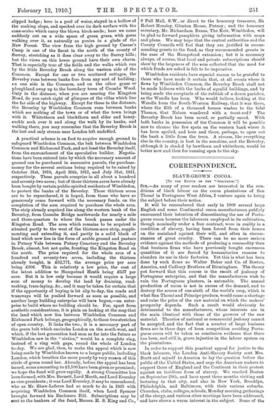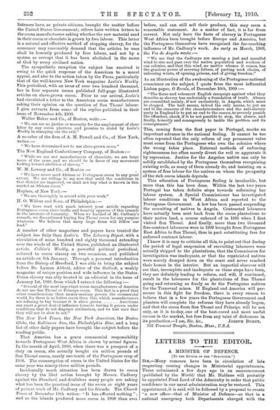CORRESPONDENCE.
SLAVE-GROWN COCOA.
[To THE EDITOR 01 THB " SPECTATOE.l
SIB,—As many of your readers are interested in the con- ditions of black labour on the cocoa plantations of San Thome in Portuguese West Africa, I venture again to bring the subject before their notice.
It will be remembered that early in 1909 several large English and some Continental cocoa manufacturers publicly announced their intention of discontinuing the use of Portu- guese cocoa because the labourers employed in its cultivation, though nominally under a free contract, were in reality in a condition of slavery, having been forced from their homes on the mainland against their will, and often in circum- stances of great cruelty. There can be no more serious evidence against the methods of producing a commodity than that business firms who have previously bought enormous quantities of it are forced by humanitarian reasons to abandon its use in their factories. Yet this is what has been done by such firms as Walter Baker and Co. of Boston, America, and Cadbury Brothers of Birmingham. The theory put forward that this course is the result of jealousy of Portuguese enterprise, and that the manufacturers wish to ruin the Portuguese planters, is untenable. The annual production of cocoa is not in excess of the demand, and to destroy the source of one-sixth of the world's crop, which is what San Thome and Principe produce, would cause a shortage and raise the price of the raw material on which the makers' prosperity depends. Such a result would obviously be detrimental to the manufacturers, whose interests are in the main identical with those of the growers of the raw material. Theories of national or commercial jealousy cannot be accepted, and the fact that a number of large business firms are in these days of keen competition avoiding Portu- guese cocoa will be taken as conclusive evidence that there has been, and still is, grave injustice in the labour system on the plantations.
In order to support this practical appeal for justice to the black labourer, the London Anti-Slavery Society sent Mrs. Burtt and myself to America to lay the question before the public of the United States, and urge the American makers to support those of England and the Continent in their protest against an insidious form of slavery. We reached Boston on September 28th, and have spent three months visiting and lecturing in that city, and also in New York, Brooklyn, Philadelphia, and Baltimore, with their various suburbs. Churches, clubs, colleges, schools, Monday morning gatherings of the clergy, and various other meetings have been addressed, and have shown a warm interest in the subject. Some of the listeners have, as private citizens, brought the matter before the United States Government; others have written letters to the cocoa manufacturers asking whether the raw material used in their cocoa or chocolate is grown by free labour. This latter is a natural and effective method of stopping slavery, for the consumer may reasonably demand that the articles he uses shall be honestly produced by free labour, and not by a system so corrupt that it has been abolished in the name of God by every civilised nation.
The sympathetic reception the subject has received is owing to the quick response of the American to a moral appeal, and also to the action taken by the Press, particularly that of the well-known New York magazine Leslie's Weekly. 1r. his periodical, with an issue of over two hundred thousand,
has in four separate issues published full-page illustrated
articles on slave-grown cocoa. Prior to our arrival, Leslie's had circulated a letter to the American cocoa manufacturers asking their opinion on the question of San Thome labour.
I give extracts from some of the replies published in their issue of November 4th, 1909.
Walter Baker and Co., of Boston, write :—
" We can see no justice or necessity for the employment of slave labor by any cocoa planters, and promise to stand by Leslie's Weekly in stamping out the evil."
A member of the firm of A. M. Powell and Co., of New York, writes :-
" We have determined not to use slave-grown cocoa."
The New England Confectionery Company, of Boston :-
" While we are not manufacturers of chocolate, we are large users of the same, and we should be in favor of any movement looking toward abolition of slavery."
W., M. Lowney and Co., of Boston :-
" We have never used African or Portuguese cocoa to any great extent. We are willing to say now that until the conditions in that district are improved, we shall not buy what is known in this market as African cocoa."
Huylers, of New York :—
"We are thoroughly in accord with your work."
H. 0. Wilbur and Sons, of Philadelphia :— " We have read with much interest your article regarding Portuguese cocoa slave traffic and heartily approve of this crusade in the interests of humanity. When we learned of Mr. Cadbury's crusade, we discontinued buying San Thome cocoa for any purpose whatever. We believe that many large firms will follow our lead."
A number of other magazines and papers have treated the subject less fully than Leslie's. The Literary Digest, with a circulation of some hundred and eighty thousand extending over the whole of the United States, published an illustrated article. Collier's Weekly, a powerful political periodical,
referred to cocoa slavery on two occasions, and published an article on 8th January. Through a personal introduction from the Bishop of Hereford, I was able to bring the subject
before Dr. Lyman Abbott, editor of the Outlook, a weekly magazine of unique position and wide influence in the States. Cocoa slavery was ably treated in an editorial in the issue of
January 1st, 1910, from which I extract the following :-
" Several of the most important cocoa manufacturers of America do not use San Thome or Principe cocoa. This fact is a proof that other considerations than money-making govern the commercial world, for there is no better cocoa than this, which manufacturers are refusing to buy because it is slave grown Americans can exert a great deal of influence towards having it grown under conditions that do not disgrace civilisation, and we feel sure that they will not be slow to act."
The New York Times, the New York American, the Boston Globe, the Baltimore Sun, the Philadelphia Star, and a long list of other daily papers have brought the subject before the reading public.
That America has a grave commercial responsibility towards Portuguese West Africa is shown by actual figures.
In the month of April, 1909, when there was a prospect of a duty on cocoa, she actually bought six million pounds of San Thome cocoa, nearly one-tenth of the Portuguese crop of 1908. The consumption of cocoa in the United States for the same year was ninety-three million pounds.
Incidentally much attention has been drawn to cocoa slavery by the libel action brought by Messrs. Cadbury
against the Standard, and doubtless many people are asking what has been the practical issue of the seven or eight years of patient work of Mr. Cadbury and his friends. The Church Times of December 10th writes : " It has effected nothing " ; and as the islands produced more cocoa in 1908 than ever
before, and can still sell their produce, this may seem a reasonable statement. As a matter of fact, it is far from correct. Not only have the facts of slavery in Portuguese West Africa been brought before Europe and America, but
the Portuguese themselves have recognised the far-reaching influence of Mr. Cadbury's work. As early as March, 1909, the Vox de Angola wrote— "We see that the Cadburys are causing a just and merciful wind to rise and pass over the native population and workers of our colonies, and that this wind, no matter whence it comes, has the gracious power of severing fetters, of parting neck chains, of unloosing wrists, of opening prisons, and of giving freedom."
As an illustration of the awakening of the Portuguese national conscience on the subject, I quote from the most influential Lisbon paper, 0 Seculo, of December 10th, 1909 :- "The fierce and vehement English campaign against what they describe as slavery has undeniably a foundation of truth. Abuses are committed mainly, if not exclusively, in Angola, which must be stopped. The best means, indeed the only means, to put an end to the censures of the chocolate-makers and the anti-slavery party in England is to put an end to the causes, to severely punish the offenders, check, if it be not possible to stop, the abuses, and finally, honestly and courageously to tackle the problem and its consequences."
This, coming from the first paper in Portugal, marks an important advance in the national feeling. It cannot be too often repeated that the only reform of any permanent value must come from the Portuguese who own the colonies where the wrong takes place. External methods of enforcing righteousness too often merely divert the evil or aggravate it by repression. Justice for the Angolan native can only be solidly established by the Portuguese themselves recognising existing evils, as many of them already do, and insisting on a system of free labour for the natives on whom the prosperity of the rich cocoa islands depends.
This education of Portuguese feeling is invaluable, but more than this has been done. Within the last two years Portugal has taken definite steps towards reforming her labour system. A Special Commissioner has investigated labour conditions in West Africa and reported to the Portuguese Government. A law has been passed suspending the recruiting of natives in Angola. Contracted labourers have actually been sent back from the cocoa plantations to their native land, a course unheard of in 1905 when I first visited San Thome. And finally, more than two thousand free-contract labourers were in 1909 brought from Portuguese East Africa to San Thome, thus in part substituting free for enforced contract labour.
I know it is easy to criticise all this, to point out that during the period of legal suspension of recruiting labourers were actually shipped to the plantations, that the Commission for investigation was inadequate, or that the repatriated natives were merely dumped down on the coast and never reached their homes in the interior. But an impartial observer will see that, incomplete and inadequate as these steps have been, they are definitely leading to reform, and will, if continued, result in the labourers for the plantations of San Thome going and returning as freely as do the Portuguese natives for the Transvaal mines. If England and America will per- severe in this fight for freedom, there is every reason to believe that in a few years the Portuguese Government and planters will complete the reforms they have already begun, and that the cocoa from San Thome and Principe will be not only, as it is to-day, one of the best-cured and most useful cocoas in the market, but free from any taint of dishonour in











































 Previous page
Previous page